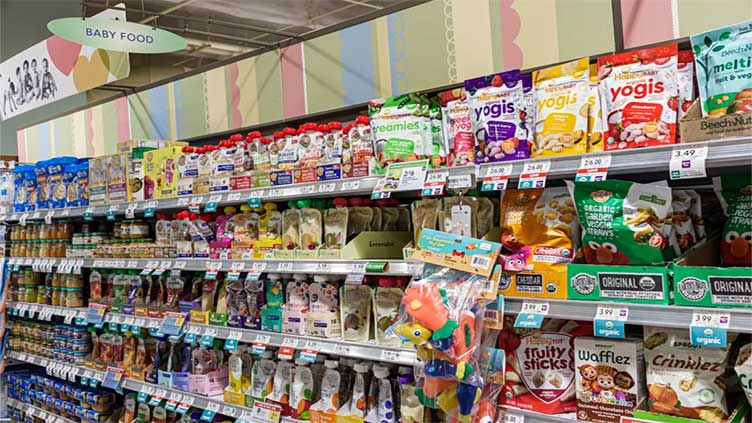Study finds 70pc baby foods in US grocery stores unhealthy

Business
The study found bad marketing practices too
(Web Desk) - Up to two-thirds of baby foods sold in US grocery stores are unhealthy, claimed a shocking study which sought to draw urgent attention of parents and policymakers to wide-spread use of misleading claims on packaging of these items.
The study done by the George Institute for Global Health found that a staggering 60 per cent of infant and toddler foods failed to meet nutritional recommendations.
None of the foods tested met promotional requirements set by World Health Organization (WHO).
The researchers assessed data on 651 infant and toddler food products sold in the top 10 US grocery chains held in the Institute’s FoodSwitch database against global benchmarks.
Out of these, 70 per cent failed to meet protein requirements and 44 per cent exceeded total sugar requirements, said the study published in the journal Nutrients on Wednesday (Aug 21).
"A further one in four products did not meet calorie requirements and one in five exceeded recommended sodium limits," the research institute said in a release.
Researchers brought attention to the concerning rise in popularity of processed convenience foods for infants and young children.
“Early childhood is a crucial period of rapid growth and when taste preferences and dietary habits form, potentially paving the way for the development of chronic diseases such as obesity, diabetes and some cancers later in life,” said researcher Dr Elizabeth Dunford.
“Our findings highlight the urgent need for better regulation and guidance in the infant and toddler foods market in the United States - the health of future generations depends on it,” said Dunford.
Busy parents are increasingly choosing such convenience foods, "unaware that many of these products lack key nutrients needed for their child’s development and tricked into believing they are healthier than they really are,” the release quoted Dunford as saying.
Baby food pouches, which grew in popularity by a whopping 900 per cent in the last 13 years, were also among the unhealthiest products assessed, with fewer than 7 per cent meeting total sugar recommendations.
MISLEADING CLAIMS
While examining the food packaging, the study found bad marketing practices too. At least one prohibited claim was found in the packaging of 99.4 per cent products.
These claims included ‘non genetically modified’ (70 per cent), ‘organic’ (59 per cent), ‘no BPA’ (37 per cent), and ‘no artificial colours/flavours’ (25 per cent).
Noting that such claims are creating a so-called ‘health halo’ around these products, reseacher Daisy Coyle said, “The lack of regulation in this area leaves the door wide open for the food industry to deceive busy parents.”
In some cases, the names of products were misleading too. “Snack and finger foods often referred to fruit or vegetables in the product name, despite primarily being made of flour or other starches,” Coyle said.


